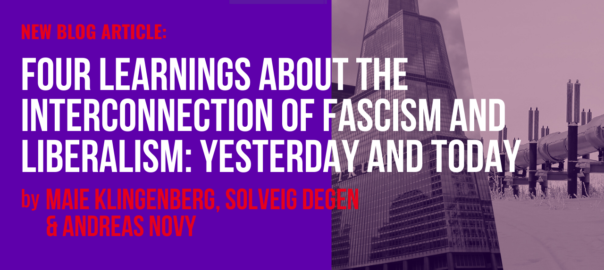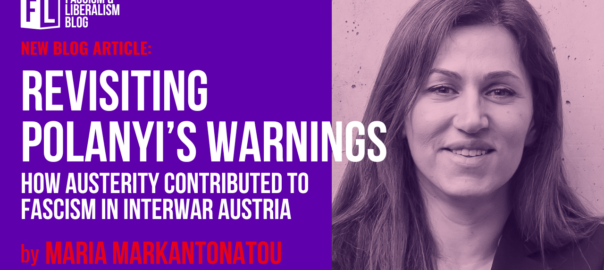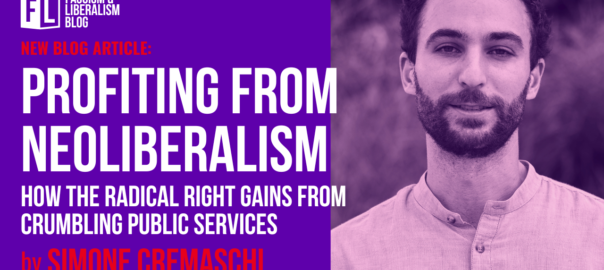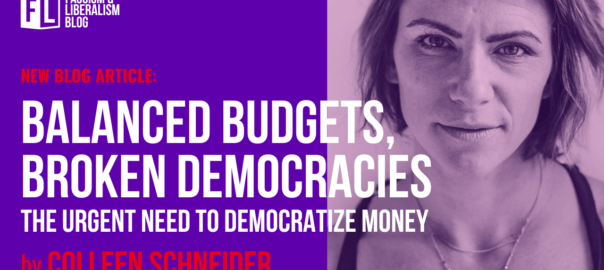Four Learnings About the Interconnection of Fascism and Liberalism: Yesterday and Today
Maie Klingenberg, Solveig Degen, and Andreas Novy
19.12.2025
Over the past months, a dozen articles on our newly founded blog have deepened our understanding of the entanglements between fascism and liberalism — both historically and today. As we look ahead to expanding our knowledge base with new authors and perspectives in the coming year, we want to use this final article of 2025 as a moment of reflection. Drawing on analyses and arguments that have been shared on our blog, we extract four learnings. Whether you are new to our blog or simply wish to revisit some of the central insights, this article is for you.
1.(Neo)liberal Austerity as an Attack on Democracy
Across several of the F&L blog articles, authors identify austerity politics as one of the central mechanisms that connect neoliberal and far-right agendas. But how does this connection actually play out? Here, we summarize two major insights.
The first is that we must begin to see the (neo)liberal call for “balanced budgets” as effectively withdrawing decisions about public spending from democratic control. As Colleen Schneider argued in her piece “Balanced Budgets, Broken Democracies”, the neoliberal orthodoxy treats government deficits as inherently problematic and insists that governments must adhere to strict fiscal limits. According to Schneider, the idea of balanced budgets, “has been used, consistently and across party lines, to justify austerity”. By this logic, governments have cut public services, rolled back welfare programs, and privatized state assets, thereby expanding the domain of markets into previously public spheres. Meanwhile, alternative understandings of the constraints on government spending have been sidelined.
As Pavlos Roufos argues in “Are We All Lisa Cook?”, the establishment of independent central banks as “non-majoritarian technocratic institutions” has served the same agenda of protecting capital accumulation against the interests of the majority. According to Roufos, independent central banks are commonly depicted as non-political institutions representing “the rational voice of the majority” and a pillar of democracy. In fact, public spending is being removed from democratic deliberation. After almost half a century of neoliberal hegemony, austerity is the new normal, legally codified in the EU’s Maastricht criteria and Germany’s debt brake.
The second major insight is that historically, such austerity measures weakened democratic forces and significantly helped the rise of 20th century fascism in Europe. After World War I and the collapsed Gold Standard, many countries underwent austerity programs to restore economic stability. According to Pavlos Roufos, it was a time of “outright hostility towards mass democracy” among liberals and conservatives, when leading liberal bankers lobbied to “insulat[e] monetary decisions from mass democracy” via central bank independence. In the case of Austria, the harsh enforcement of austerity measures mandated by the League of Nations was accompanied by an order to suppress any resistance by trade unions and political opponents, as Maria Markantonatou details in her article “Revisiting Polanyi’s warnings”, which describes how austerity politics enabled the rise of austrofascism. She cites Karl Polanyi in concluding that these measures “resulted in a decisive weakening of the democratic forces which might otherwise have averted the fascist catastrophe”. Strikingly, as Janek Wasserman points out in his article on “Functional Democracy” libertarian economist Ludwig van Mises “disparaged parliamentarianism and sided with conservatives and fascists in a quest for economic stability”. As Clara Mattei and Aditya Singh write in “Unmasking the Dehumanizing Logic of the Capital Order”, in Italy, the liberal establishment supported the rise of Benito Mussolini, as they “recognized that only an authoritarian state could defend the capital order”.
Drawing on these historical insights, it becomes apparent that liberalism and fascism are deeply entangled in their quest to minimize democratic control over public investments and monetary policy. Thus, fighting austerity measures and re-politicizing discourses around central banking and balanced budgets is of key importance for anti-fascist economics and politics in the 21st century.
2.A Shared Sinister View on Humanity as Self-fulfilling Prophecy
We draw a second key learning on the interconnection of liberalism and fascism from Natascha Strobl’s piece “A Perpetuum Mobile of Cynicism”. The article called our attention to the common psychological ground of fascism and neoliberalism: their shared negative conception of humanity where life is seen as a constant struggle for survival. Further, Strobl argues that “[o]ur experiences with neoliberalism confirm the fascist view that the world really is as bleak, ruthless and harsh as it has always been claimed to be”. Thus, it is instructive to think of fascists’ and neoliberals’ shared view of humanity as a sort of self-fulfilling prophecy.
According to Natascha Strobl, fascists as well as neoliberals — explicitly or implicitly — draw from Social Darwinism, seeing “survival of the fittest” as a desirable form of natural selection among humans. In this view, social welfare helps those who, in fact, do not deserve to make it. Here, an important parallel can be drawn to Nancy MacLean’s analysis of the historical genesis of the global libertarian and immensely influential think tank the Atlas Network. In her piece “Enchaining Democracy”, MacLean describes how the founders of the network were deeply influenced by the ideas of libertarian economist and Nobel laureate James M. Buchanan, who coined Public Choice Theory. According to this theory, politicians should be understood as self-interested actors whose actions are motivated by their own personal gain. He used this theory to explain why politicians would “overspend” in times of prosperity and not only in times of recession or crisis as Keynesians had argued before, thereby effectively “stealing” the money of wealthy taxpayers for their own political agenda. Buchanan’s view on taxes is far from a fringe view but gained immense popularity in conservative and liberal circles across the world – not least through the conscious efforts of libertarian think tanks, as we’ll return to later. In the view of Buchanan and the like, wealth is a sign of success in the civilizational struggle, leaving no reason to reward the losers of the game. On this ground, it is desirable to cut corporate and income taxes for the wealthy and to slash pensions, social benefits and investments in public infrastructure.
By applying their sinister logic to politics, neoliberals have created the conditions in which their outlook on society has become a reality for the majority: After half a century of austerity politics, life feels precarious and threatened for many, with fellow humans appearing as competitors in a zero-sum game over shrinking public services. Moreover, the promise to improve public services for everyone has lost credibility, as left-wing governments often fail to deliver due to international debt obligations or austerity written into constitutions. This loss of credibility, in turn, increases the appeal of centrist and far-right calls to exclude “undeserving outsiders” and “slackers” from access to public services.
3.The Rise of the Far Right as an Orchestrated Project from Above
While the rise of the far right might appear as an inevitable consequence of the socioeconomic grievances neoliberalism has created, many authors of our blog series reminded us that their ascent is not accidental, nor their victory a foregone conclusion.
As detailed by Nancy MacLean, the far right’s rise is the result of many years of groundwork by wealthy and powerful actors. Already in the 1970s, James Buchanan began building his market fundamentalist “counterintelligentsia” in order to push back on welfare policies. He won the billionaires Charles and David Koch to his cause, who began building the Koch Network of hundreds of like-minded, wealthy, conservative and libertarian donors, supporting right-wing organisations and education programs. A crucial part of this cosmos is the Atlas Network – the world’s largest think tank network, which provides enormous funds for libertarian research and has been shown to deliberately finance misinformation campaigns. Its entanglements – for example with the Mont Pelerin Society, the Friedrich Hayek Association in Germany, or the Austrian Economics Center – together with far-right parties such as AfD and FPÖ in Germany and Austria — exemplify the convergence of libertarian and far-right agendas.
Indeed, especially in times of crises, the capitalist class has something to win from an authoritarian state that protects business interests at all cost but is minimal in terms of public spending. This is also the reason why tech-oligarchs like Elon Musk and Peter Thiel have been trying to seize “the second Trump Administration as an opportunity to fundamentally reshape the federal government”, as Fred Block argues in his piece “Untangling Donald Trump”. In the interwar period, we can find similar, troubling alliances. As recounted by Clara Mattei and Aditya Singh, leading English banker Montagu Norman admitted to the equally influential American banker Jack Morgan Jr: “Fascism has surely brought order out of chaos over the last few years […]” and called Italian fascist leader Mussolini “the right man at a critical moment.”
What can we learn from this? While socioeconomic and psychological explanations for growing support for the far-right remain important, they are insufficient on their own. The far right’s current ascendancy must also be understood as the product of a sustained, decade-long effort by wealthy and powerful networks, especially those rooted in libertarian segments of conservatism.
However, while it is certainly true that fascist tendencies run deeply in our societies, Fred Block reminds us that the capitalist class is politically divided, with significant segments of the US business elite remaining firmly aligned with the Democratic Party. Far-right, libertarian projects, precisely because they depend on a group of extremely wealthy and powerful individuals, also tend to be incoherent and unstable. Block, for example, notes that Donald Trump’s erratic governance style – by “attacking so many different constituencies simultaneously” – could undermine the support of his voter base in the long run.
4.Ecological Crises as Accelerator of the Far Right
While it is obvious that far-right forces consisting of climate denialists and fossil rentiers will likely intensify ecological crises, we want to draw attention to the reverse: how escalating ecological crises accelerate the rise of the far right. Although the topic of ecological crises has not featured prominently on this blog so far, we want to highlight some of the major learnings we can draw from the contributions, firstly, because ecological crises form a critical condition setting today’s interplay of fascism and liberalism apart from past ones, and secondly, because we must resist the dangerous decline in attention paid to the climate crisis. Thus, we highlight two important causal mechanisms concerning the nexus between fascism, liberalism, and ecological crises.
First, the effect of austerity politics makes communities more receptive to far right narratives when experiencing ecological disasters. Simone Cremaschi presented this finding in his article “Profiting from Neoliberalism”, citing research that found that in Italian communities with lower levels of public services, far-right parties gained significantly after ecological shocks. The reason: communities that experience prolonged public service deprivation tend to develop narratives about abandonment by the government. They are not only ill-equipped to counter ecological shocks but quickly come to interpret such events as just another instance of state neglect. Thus, the initial assumption among progressives that communities would become supportive of climate politics once the effects of climate change were more tangible is called into question.
Second, as Julia Steinberger and Céline Keller highlight in their piece “Welcome to Cataclysm Capitalism”, “[m]ajor companies are no longer even bothering with greenwashing” and “have given up the slightest pretence of taking the climate and ecological crises seriously.” However, the point is not only about the shifting political climate in which big businesses are no longer held accountable for doing the tedious work that would be required to decarbonize entire industries. As Natascha Strobl argues, major industries such as the fossil industry are in fact the beneficiaries of antidemocratic agendas. As the practice of burning fossil fuels at the cost of present and coming generations would probably not stand a chance in truly democratic societies, fascism becomes declining industries’ best bet. Hence, we see the fossil industry “pumping money into the neoliberal-fascist ecosystem” according to Strobl.
Considering the major contestations around ecological policies led by liberal parties – as, for instance, experienced with the German “Heizungsgesetz” (heating law), the question remains how to make effective climate politics in the current political climate.
What will happen next?
Across a dozen blog articles, our authors have uncovered some of the profound tensions and contradictions between economic liberalism and democracy, an alliance once celebrated as the pinnacle of Enlightenment progress, even the “end of history.” The takeover of the far right we see today can, in many ways, be understood not as a rupture, but as a morphed continuity. As Daniela Caterina and her co-authors compellingly argue in their piece “From Berlusconi to Meloni”, “far-right forces are gaining ground across the world not by overcoming neoliberalism, but by reshaping it through further and deeper exclusionary, authoritarian, and nationalist politics”.
This reflection – though incomplete – has drawn together some of the key insights offered by our contributors. Our blog remains an evolving project, and we look forward to continuing this collective endeavor in the coming year.

Maie Klingenberg is a research assistant at the ISSET Institute at WU Vienna working on the democratization and deprivatization of provisioning systems.

Solveig Degen is a PhD student at the Centre for Social Critique in Berlin working on the socialisation of public services.

Andreas Novy is is associate professor and head of the ISSET Institute at WU Vienna and president of the International Karl Polanyi Society (IKPS).
References
- Block, Fred. 2025. „Untangling Donald Trump: Between Liberalism and Fascism.“ Fascism & Liberalism Blog. International Karl Polanyi Society.
- Caterina, Daniela, Adriano Cozzolino, Gemma Gasseau, und Davide Monaco. 2025. „From Berlusconi to Meloni: Right-wing Politics and the Making of Italy’s Neoliberal State.“ Fascism & Liberalism Blog. International Karl Polanyi Society.
- Cremaschi, Simone. 2025. „Profiting from Neoliberalism: How the Radical Right Gains from Crumbling Public Services.“ Fascism & Liberalism Blog. International Karl Polanyi Society.
- MacLean, Nancy. 2025. „Enchaining Democracy: The Koch Network’s Stealth Crusade for Free-Reign Capitalism.“ Fascism & Liberalism Blog. International Karl Polanyi Society.
- Markantonatou, Maria. 2025. „Revisiting Polanyi’s Warnings: How Austerity Contributed to Fascism in Interwar Austria.“ Fascism & Liberalism Blog. International Karl Polanyi Society.
- Mattei, Clara, und Aditya Singh. 2025. „Unmasking the Dehumanizing Logic of the Capital Order.“ Fascism & Liberalism Blog. International Karl Polanyi Society.
- Roufos, Pavlos. 2025. „Are We All Lisa Cook? Central Bank Independence and the Politics of Depoliticization.“ Fascism & Liberalism Blog. International Karl Polanyi Society.
- Schneider, Colleen. 2025. „Balanced Budgets, Broken Democracies: The Urgent Need to Democratize Money.“ Fascism & Liberalism Blog. International Karl Polanyi Society.
- Steinberger, Julia, und Céline Keller. 2025. „Welcome to Cataclysm Capitalism: Confronting the Dangerous Merger of Neoliberalism and the Silicon Valley Far-Right.“ Fascism & Liberalism Blog. International Karl Polanyi Society.
- Strobl, Natascha. 2025. „A Perpetuum Mobile of Cynicism: On the Symbiosis of Neoliberal and Fascist Views of Humanity.“ Fascism & Liberalism Blog. International Karl Polanyi Society.
- Wasserman, Janek. 2025. „Functional Democracy: Polanyi’s Forgotten Antidote to Fascism and Neoliberalism.“ Fascism & Liberalism Blog. International Karl Polanyi Society.








